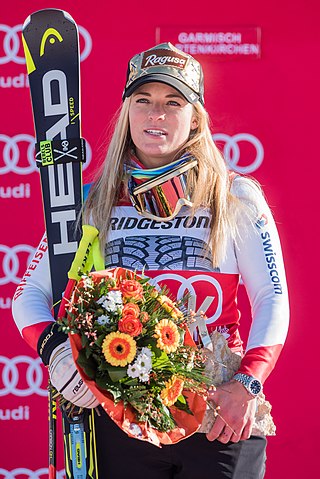
The International Ski Federation (FIS) Alpine Ski World Cup was the premier circuit for alpine skiing competition. The inaugural season launched in January 1967, and the 2017–18 season marked the 52nd consecutive year for the FIS World Cup.

The International Ski Federation (FIS) Alpine Ski World Cup, the premier circuit for alpine skiing competition, began in January 1967, and the 2019–20 season marked the 54th consecutive year for the FIS World Cup. As it had every year since 2006, the season began in Sölden, Austria in October. The season was supposed to end with the World Cup finals in March, which were to be held in Cortina d'Ampezzo, Italy for the first time since they began in 1993, but the finals were cancelled due to the COVID-19 outbreak in Italy.

The International Ski Federation (FIS) Alpine Ski World Cup was the premier circuit for alpine skiing competition. The inaugural season launched in January 1967, and the 2020–21 season marked the 55th consecutive year for the FIS World Cup. As it had every year since 2006, the season began in Sölden, Austria in October, and it ended with the World Cup finals in March, which were held in Lenzerheide, Switzerland. However, the COVID-19 pandemic forced many changes to the original racing schedule. Among them were the following:

The men's super-G in the 2021 FIS Alpine Skiing World Cup consisted of six events, although seven had been originally scheduled.

The men's downhill in the 2020 FIS Alpine Skiing World Cup consisted of nine events, with only one cancellation from the scheduled ten.

The men's super-G in the 2020 FIS Alpine Skiing World Cup involved six events, as the last two scheduled Super-Gs were canceled.

The men's overall in the 2020 FIS Alpine Skiing World Cup consisted of 36 events in 6 disciplines: downhill (DH), Super-G (SG), giant slalom (GS), slalom (SL), Alpine combined (AC), and parallel (PAR). The season was originally scheduled to have 44 men's races plus a mixed team event, but a race in Japan plus final the seven men's races and the mixed team event were all cancelled, as discussed below.

The International Ski Federation (FIS) Alpine Ski World Cup was the premier circuit for alpine skiing competition. The inaugural season launched in January 1967, and the 2021–22 season marked the 56th consecutive year for the FIS World Cup.

The women's super-G in the 2022 FIS Alpine Skiing World Cup consisted of nine events including the final. Although no Italian woman had ever won the super-G championship, the battle in 2021-22 was between three of them: speed specialists Sofia Goggia and Elena Curtoni plus 2020 overall champion Federica Brignone. Through the first six races, Curtoni had won one, and each of the others had won two. However, Goggia was injured in a crash in the sixth race, in Cortina d'Ampezzo, and missed the next set of speed races as well as the super-G in the 2022 Winter Olympics. The seventh race, which was held days before the Winter Olympics, was skipped by many of the other top competitors, but was won by Brignone, enabling her to open a sizable lead in the discipline, and Brignone was able to clinch the season championship in the next Super-G when neither Curtoni nor Goggia scored points.

The men's downhill in the 2022 FIS Alpine Skiing World Cup included eleven events including the final. A scheduled downhill on 5 December 2021 at Beaver Creek, Colorado was cancelled due to bad weather, but after several abortive attempts to run it at other venues, it was finally added to Kvitfjell on March 4, the day before the previously-scheduled race.

The men's overall in the 2022 FIS Alpine Skiing World Cup consisted of 37 events in 5 disciplines: downhill, Super-G, giant slalom, slalom, and parallel. The sixth discipline, Alpine combined, had all of its events in the 2021–22 season cancelled due to the schedule disruption cased by the COVID-19 pandemic, which also happened in 2020–21. The schedules were also revamped as a consequence of the pandemic, thus ensuring that the combined number of speed races was the same as the combined number of technical races, with just one parallel race. The season did not have any cancellations.

The International Ski Federation (FIS) Alpine Ski World Cup is the premier circuit for alpine skiing competition. The inaugural season launched in January 1967, and the 2022–23 season marks the 57th consecutive year for the FIS World Cup.

The women's super-G in the 2023 FIS Alpine Skiing World Cup included eight events, including the final. The original schedule called for nine events, but a scheduled downhill at St. Anton on 14 January was converted to a super-G due to the inability to hold pre-race practice runs on either of the two days prior to the event. A later super-G at Cortina was converted into a downhill to restore the original schedule balance, but then a downhill at Crans Montana on 25 February had to be delayed a day due to fog and dangerous course conditions, and the super-G previously scheduled for that day was cancelled and not rescheduled.

The men's downhill in the 2023 FIS Alpine Skiing World Cup consisted of ten events, including the final. The season had been planned with fourteen downhills, but early in the season, two scheduled downhills on 29/30 October 2022 on the Matterhorn, running from Switzerland (Zermatt) into Italy (Cervinia), were canceled due to lack of snow and not rescheduled. Later in the season, a downhill scheduled for Garmisch-Partenkirchen on 28 January 2023 was also cancelled for lack of snow and not rescheduled. Finally, on 3 March, a scheduled downhill at Aspen was canceled due to poor visibility and deteriorating weather conditions, even though 24 racers had already started. The first out of the starting gate, Norway's Adrian Smiseth Sejersted, held the lead and was hoping for six more competitors to start so that the race would become official, but the weather conditions prevented that.

The men's super-G in the 2023 Alpine Skiing World Cup consisted of eight events, including the final. The season was originally planned with eight races, but two were cancelled early in the season and were not planned to be rescheduled. However, when two races planned at Garmisch-Partenkirchen on 28-29 January 2023 were cancelled due to a lack of snow, the two previously-cancelled Super-G races were rescheduled on those dates at Cortina d'Ampezzo, restoring the original Super-G schedule plan.

The men's super-G in the 2017 Alpine Skiing World Cup involved six events, including the finals in Aspen, Colorado (USA). Although Norwegian skier Aleksander Aamodt Kilde was the defending champion in the discipline, fellow Norwegian Kjetil Jansrud won the first three Super-G races of the season. With only six events in the discipline, Jansrud then clinched the season championship before the finals merely by finishing seventh in the fifth Super-G of the year in Kvitfjell, Norway.

The men's super-G competition in the 2016 FIS Alpine Skiing World Cup involved eight events, including the finals in St. Moritz, Switzerland.

The men's downhill in the 2024 FIS Alpine Skiing World Cup consisted of eight events. The season had been planned with thirteen downhills, but two scheduled downhills on 11/12 November 2023 on the Matterhorn, running from Switzerland (Zermatt) into Italy (Cervinia), were canceled for the second straight year, this time due to heavy snowfall and high winds, and only one has been rescheduled. The two downhill races after that, scheduled in the U.S. at Beaver Creek, Colorado, were also cancelled for the same reason, although they still may be rescheduled—meaning that the downhill season had not completed a race as of early December despite having had four scheduled, with the next attempt being the rescheduled race at Val Gardena/Gröden. One of the Beaver Creek races was rescheduled at Wengen on 11 January 2024. As described in the season summary, two February downhills at Chamonix, France were cancelled later in the season, reducing the total races in the discipline to nine. In the last race of the World Cup season, the final was also cancelled, meaning that seven men's downhills were cancelled during the season and only two of those were rescheduled.

The men's super-G in the 2024 Alpine Skiing World Cup consisted of seven events, including the final. The first event of the season was not scheduled until 3 December 2023 in Beaver Creek, and six of the eight races were scheduled to be complete by the end of January 2024. However, as described below, the first race in Beaver Creek was canceled and not rescheduled.

The men's downhill in the 2025 FIS Alpine Skiing World Cup is scheduled to consist of nine events, including the finals. Two-time discipline champion Aleksander Aamodt Kilde of Norway, who failed to win last season because he suffered life-threatening injuries on the Lauberhorn downhill course in January 2024, developed a shoulder infection at the surgical site over the summer and needed a second surgery, which is expected to cause him to miss the entire season, making defending discipline champion Marco Odermatt of Switzerland an overwhelming favorite to earn the season championship.












